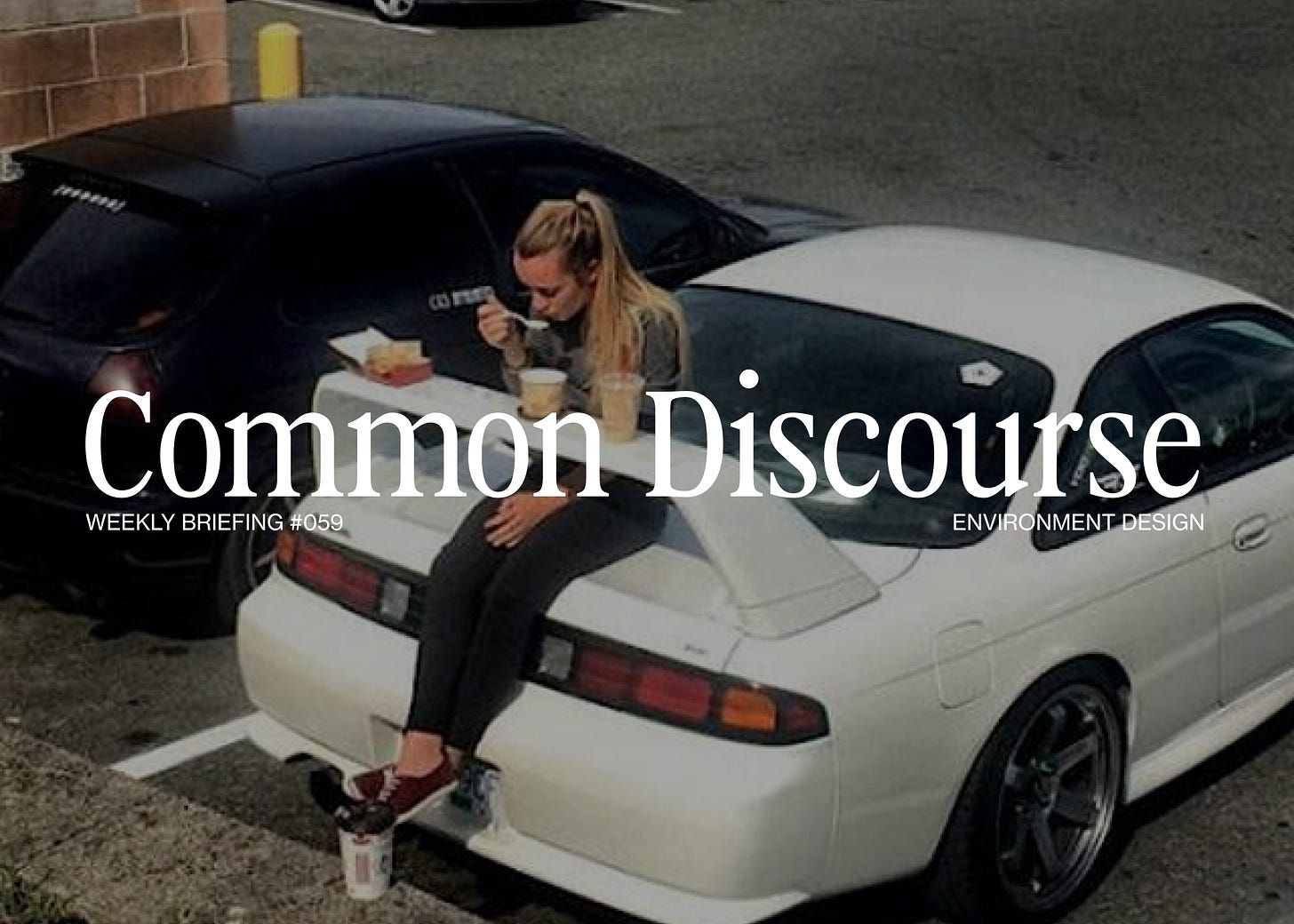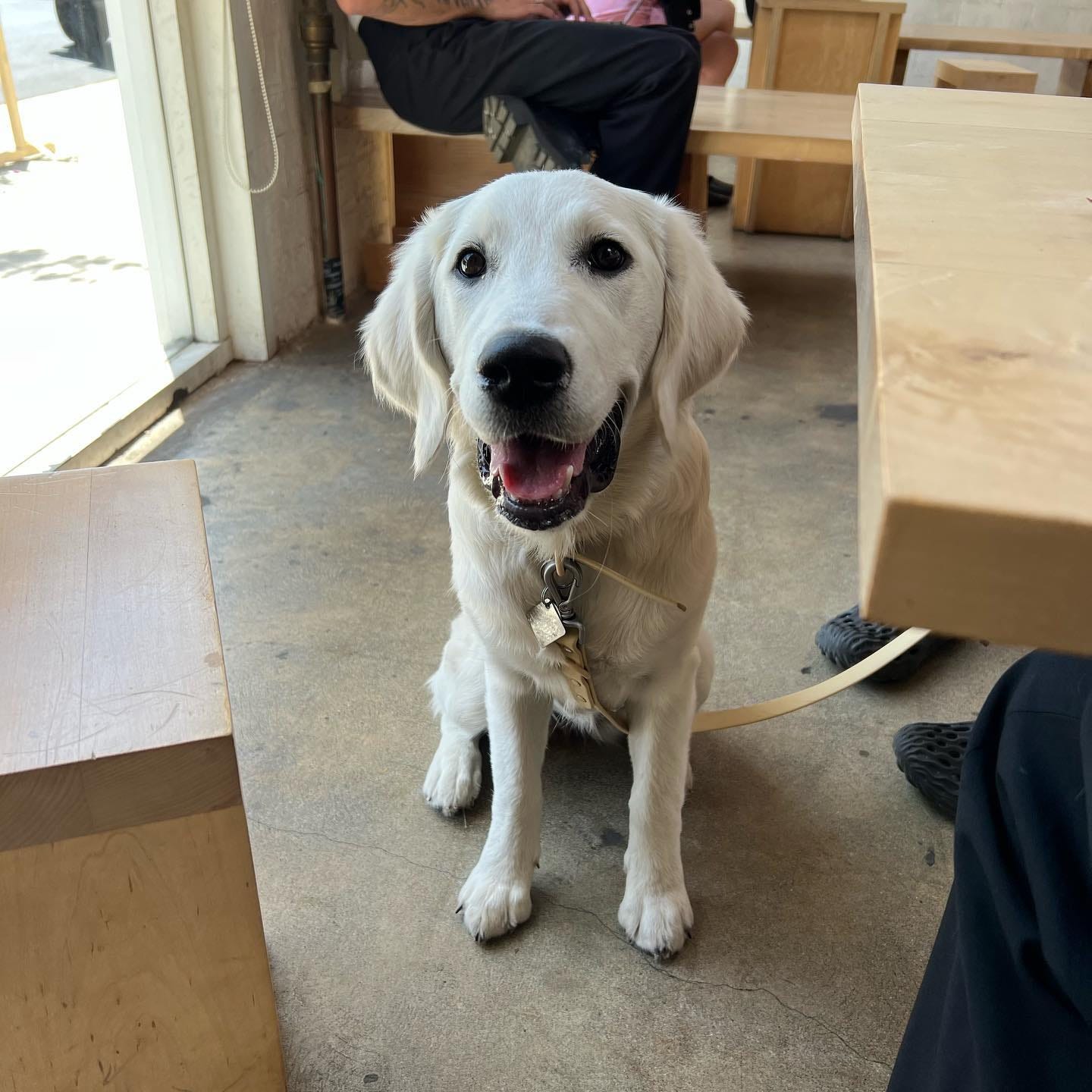#059 Environment Design
Common Discourse is a project designed to help others (and ourselves) think through creativity, focus, and intentional work—from Alex Tan & Alice Otieno.
Every Tuesday we share words from a journal, a few ideas, a quote from somebody else, and links worth sharing. On Fridays we invite a guest to share images from their camera roll and a sound that resonates with them.
Mackenzie and I are watching our friend’s 8-month old Golden Retriever puppy while they’re out of town visiting family, mostly to help them out, but it’s also fun to see what sort of wild variables we can throw into the midst of our routinely consistent lives.
A few observations so far:
People are so much more friendly when you’re standing there with a dog on a leash
Picking up dog shit in a plastic bag with your hand is repulsive
You must keep everything you’ve ever loved or spent a lot of money on out of reach
I read a while ago about this term called Management in dog training which refers to intentionally designing and reorganizing an environment to help enforce behaviors in young dogs. Essentially, it’s easier to change the surroundings than it is to change the dog. Instead of commanding a dog to stop chewing on shoes, just put the shoes out of their sight.
With Winnie running around our 600 square foot apartment, I’ve started to think a lot about how effective this environmental design intent is for her, and questioning why we don’t do more of the same as humans for each other.
For example, one thing I think we all want more of for ourselves and each other is to be able to take breaks or time off without feeling guilty. We naturally feel this way because many work environments have strange political auras around work ethic. Additionally, we have a load of pride as individuals for staying busy. I don’t have to explain why both of these things can have negative impact, but if we want that to change, we have to design an environment that encourages people to see time off and breaks as a vital part of what it means to be their best selves.
To me, that looks like congratulating each other for resting, taking time off, and saying no. Positive reinforcement allows for more and encouragement tells people that they’re doing something right.
Here’s another way of looking at it:
A painter would never question whether or not they’re allowed to make a mess in the studio, you’d never ask the barista if you were allowed to drink your coffee inside the coffee shop, and you’d probably assume the person working at the Pro Shop knows a thing or two about golf.
Properly designed environments grant permission.
Create spaces that provide answers before they have questions. We’re successful when people can look around and think, “I get it.”
— Alex
A few ideas
I. EVERYONE
When we do what everyone else is doing, we get what everyone else gets. But that’s not the only choice.
“Everyone” almost always leaves out the people who go first, who change things, who are weird, who turn left when they turned right, who ask questions when they all agreed.
So yeah, everyone is doing this or that. Except the ones who made a difference.
II. UNEXPLAINABLE
Since the beginning of time, the answer to “What do you do?” could be answered with one word.
Finance. Sales. Education.
But today, most jobs exist in liminal spaces: Kind of like this but also not quite that.
It may have been fair to think that any explanation longer than a one-word, universally understood, job title was just an attempt to look more professional than you really were.
Today, the most interesting people I know are not only existing in difficult-to-define spaces, but are having success and confidence being there.
Being explainable is for them, not you.
III. ROOTS
Many companies over the last 30 years have exploded, then folded—building their products or offerings on technology that is no longer applicable to modern life.
The ones still standing are focused on an approach or philosophy, not a physical output.
When why is established, what has the freedom to change.
A tree with deep roots isn’t afraid of the wind.
A quote from somebody else
"With a theme, happiness becomes more about how you behave rather than what you achieve. Life is not a series of wins and losses. Though our highs and lows may shock us, lift us up, and forever shape our memories, they do not define us. Most of life happens in the in-between, and what we want in life must be found there.” — Niklas Göke
Links worth sharing
🎥 We Trust What You Are Telling Us, A short-film By Rachel Nguyen.
🅰️ Source Type is a collaborative platform where people can find and buy different typefaces, as well as read editorials pieces from the community.
🌇 On Summer Crushing by Hanif Abdurraqib
🖥 Drawing in Future is a short video essay by Laura Houlberg that examines the etymology of the word “contract”, and our relationship with its meaning(s) post-2020.
💞 A Poem Called Love is an endless poem written in real time by Alex Dimitrov, tweeted once a day
🏠 Firefly Sanctuary is a website that documents different objects, moments and rooms within Laurel Schwulst’s home.
Thanks for consuming!
ABOUT
ℹ️ Read more about Common Discourse here.
📬 If you like this newsletter, please consider sharing with others who might enjoy it as well.
🗂 Here is every Common Discourse weekly briefing to date.
COMMUNITY
🐤 We have a Twitter feed where we populate things that resonate.
⭐ We use Are.na as a tool to archive specific aspects of this project.
🗣️ This project is more fun when there is dialogue amongst those who are reading. Use the comment feature at the bottom of this article to start a conversation, we’ll use your ideas for future briefings and food for thought.



This newsletter is the highlight of my week! Such fascinating thoughts and links to other creators. Thank you for doing this!
One of my favorite letters. Just wanted to chime also that it's Rachel "Nguyen"! I love her work so I just wanted her name to be recognized especially as a Vietnamese American creator.